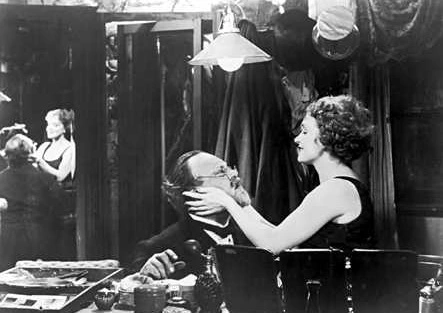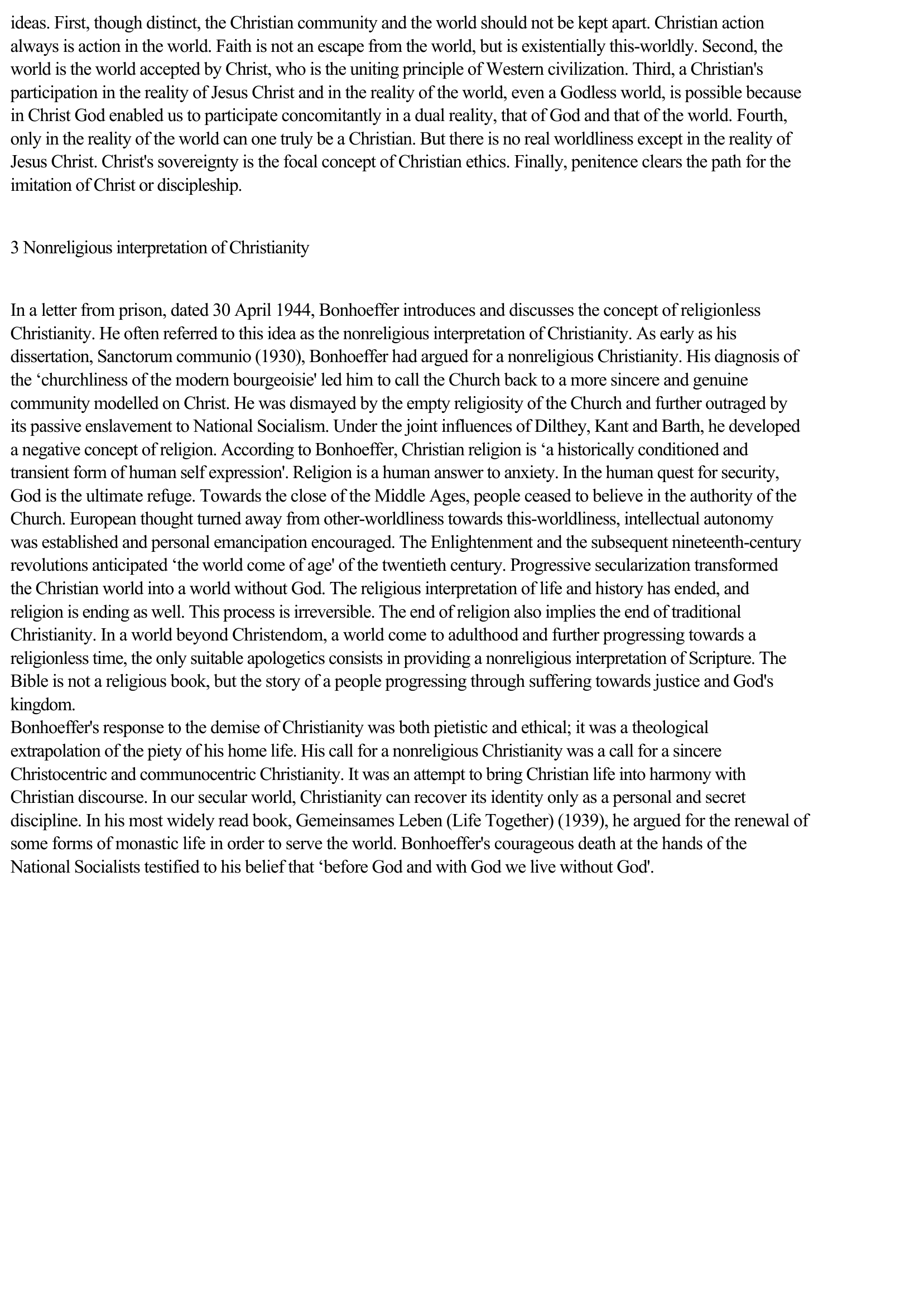Bonhoeffer, Dietrich
Publié le 22/02/2012

Extrait du document


«
ideas.
First, though distinct, the Christian community and the world should not be kept apart.
Christian actionalways is action in the world.
Faith is not an escape from the world, but is existentially this-worldly.
Second, theworld is the world accepted by Christ, who is the uniting principle of Western civilization.
Third, a Christian'sparticipation in the reality of Jesus Christ and in the reality of the world, even a Godless world, is possible becausein Christ God enabled us to participate concomitantly in a dual reality, that of God and that of the world.
Fourth,only in the reality of the world can one truly be a Christian.
But there is no real worldliness except in the reality ofJesus Christ.
Christ's sovereignty is the focal concept of Christian ethics.
Finally, penitence clears the path for theimitation of Christ or discipleship.
3 Nonreligious interpretation of Christianity
In a letter from prison, dated 30 April 1944, Bonhoeffer introduces and discusses the concept of religionlessChristianity.
He often referred to this idea as the nonreligious interpretation of Christianity.
As early as hisdissertation, Sanctorum communio (1930), Bonhoeffer had argued for a nonreligious Christianity.
His diagnosis ofthe ‘churchliness of the modern bourgeoisie' led him to call the Church back to a more sincere and genuinecommunity modelled on Christ.
He was dismayed by the empty religiosity of the Church and further outraged byits passive enslavement to National Socialism.
Under the joint influences of Dilthey, Kant and Barth, he developeda negative concept of religion.
According to Bonhoeffer, Christian religion is ‘a historically conditioned andtransient form of human self expression'.
Religion is a human answer to anxiety.
In the human quest for security,God is the ultimate refuge.
Towards the close of the Middle Ages, people ceased to believe in the authority of theChurch.
European thought turned away from other-worldliness towards this-worldliness, intellectual autonomywas established and personal emancipation encouraged.
The Enlightenment and the subsequent nineteenth-centuryrevolutions anticipated ‘the world come of age' of the twentieth century.
Progressive secularization transformedthe Christian world into a world without God.
The religious interpretation of life and history has ended, andreligion is ending as well.
This process is irreversible.
The end of religion also implies the end of traditionalChristianity.
In a world beyond Christendom, a world come to adulthood and further progressing towards areligionless time, the only suitable apologetics consists in providing a nonreligious interpretation of Scripture.
TheBible is not a religious book, but the story of a people progressing through suffering towards justice and God'skingdom.Bonhoeffer's response to the demise of Christianity was both pietistic and ethical; it was a theologicalextrapolation of the piety of his home life.
His call for a nonreligious Christianity was a call for a sincereChristocentric and communocentric Christianity.
It was an attempt to bring Christian life into harmony withChristian discourse.
In our secular world, Christianity can recover its identity only as a personal and secretdiscipline.
In his most widely read book, Gemeinsames Leben (Life Together) (1939), he argued for the renewal ofsome forms of monastic life in order to serve the world.
Bonhoeffer's courageous death at the hands of theNational Socialists testified to his belief that ‘before God and with God we live without God'..
»
↓↓↓ APERÇU DU DOCUMENT ↓↓↓
Liens utiles
- Bonhoeffer, Dietrich Bonhoeffer, Dietrich (1906-1945), théologien luthérien allemand qui marqua par son destin et son oeuvre le christianisme contemporain depuis son exécution par les nazis.
- Bonhoeffer (Dietrich) Théologien protestant allemand (Breslau, 1906 - camp de concentration de Flossenbürg, 1945).
- SYSTÈME DE LA NATURE (LE), ou Des lois du monde physique et du monde moral, 1770. Holbach (Paul-Henri Dietrich, baron d’)
- CHRISTIANISME DÉVOILÉ (Le) D’Holbach (Paul Henri Dietrich, baron) - résumé de l'oeuvre
- ANNIBAL [Hannibal]. (résumé & analyse) Christian Dietrich Grabbe

































